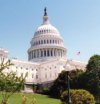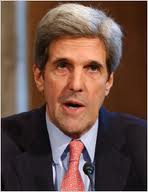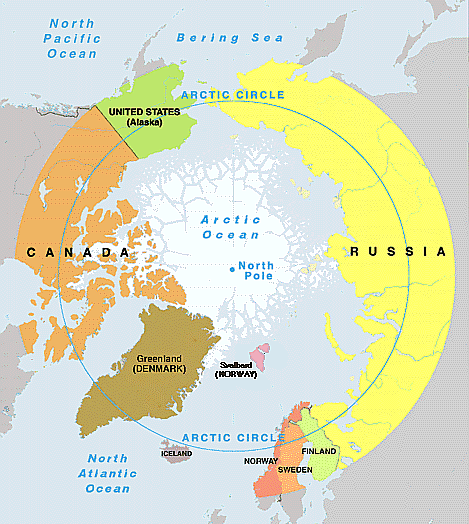|
|
|
|
|
|
|
|
 Today's Congressional Action: Today's Congressional Action:
The House and Senate are not in session.
|
 Kerry: Alaska Trip, Glacier Conference Show Obama's Commitment to Arctic. Federal officials have made a lot of unfulfilled promises in the past about paying attention to the issues and needs of the far north, so Alaskans have a right to be skeptical about new promises, Secretary of State John Kerry said Sunday. "I know that Alaskans have long felt that Washington and the rest of the country don't necessarily understand the special issues that arise in living in Alaska," Kerry told reporters at a news conference in Anchorage. Alaska Dispatch News Kerry: Alaska Trip, Glacier Conference Show Obama's Commitment to Arctic. Federal officials have made a lot of unfulfilled promises in the past about paying attention to the issues and needs of the far north, so Alaskans have a right to be skeptical about new promises, Secretary of State John Kerry said Sunday. "I know that Alaskans have long felt that Washington and the rest of the country don't necessarily understand the special issues that arise in living in Alaska," Kerry told reporters at a news conference in Anchorage. Alaska Dispatch News
On Road to Paris Climate Change Talks, Obama Detours Through Alaska. With the effects of climate change growing ever more apparent in the Arctic and throughout the world, there are high hopes that parties attending a December meeting in Paris will emerge with a legally binding global treaty to reduce emissions. And the road to such an agreement will cut right through downtown Anchorage. Alaska's reputation in the public consciousness as a poster child for climate change, combined with U.S. chairmanship of the Arctic Council, have helped give rise to the GLACIER conference. High-ranking foreign delegations from Italy to India will meet at the Dena'ina Civic and Convention Center in Alaska's largest city. Alaska Dispatch News
UAF Professor Leads Arctic Ecosystem Science Initiative. University of Alaska Fairbanks professor Vladimir Romanovsky has been named chief scientist for a U.S. Department of Energy initiative to study Arctic ecosystems. The Next-Generation Ecosystem Experiments in the Arctic leadership team in May appointed Romanovsky to the role. Romanovsky is a professor of geophysics at the UAF Geophysical Institute. "The NGEE project represents really good coordination for integrated field campaigns," Romanovsky said. "I don't know of any other project which has this kind of breadth and depth at the same time." University of Alaska Fairbanks
 Glacier Conference in Anchorage Will Address Climate Change in the Arctic, and More. The president of the United States is the star speaker on Monday at a conference in Anchorage on Arctic issues, ensuring the eyes of the world will be on Alaska and the rapid changes happening in the far North. President Obama will give the closing address at the Conference on Global Leadership in the Arctic: Cooperation, Innovation, Engagement and Resilience, otherwise known as GLACIER. Other high-level speakers at the event, to be held in the Dena'ina Center, include Secretary of State John Kerry, Interior Secretary Sally Jewell and Norwegian Foreign Minister Borge Brende. Sharing the podium with such luminaries will be Evon Peter, vice chancellor for rural community and Native education at the University of Alaska Fairbanks. Alaska Dispatch News Glacier Conference in Anchorage Will Address Climate Change in the Arctic, and More. The president of the United States is the star speaker on Monday at a conference in Anchorage on Arctic issues, ensuring the eyes of the world will be on Alaska and the rapid changes happening in the far North. President Obama will give the closing address at the Conference on Global Leadership in the Arctic: Cooperation, Innovation, Engagement and Resilience, otherwise known as GLACIER. Other high-level speakers at the event, to be held in the Dena'ina Center, include Secretary of State John Kerry, Interior Secretary Sally Jewell and Norwegian Foreign Minister Borge Brende. Sharing the podium with such luminaries will be Evon Peter, vice chancellor for rural community and Native education at the University of Alaska Fairbanks. Alaska Dispatch News
|
|
Legislative Action
No Arctic legislation was formally considered Friday.
|
|
Future Events
11th Conference on Hunting and Gathering Societies (CHAGS XI), September 7-11 (Vienna, Austria). The study of hunter-gatherer societies has become, since the landmark conference "Man and Hunter" in 1966, a major topic of study within the social and human sciences community. While scholarly foci have changed during the last 50 years, the principle goal generated during the initial conference, to establish a unified field of hunter-gatherer studies, is as valid today as it was then. CHAGS XI hopes to explore how research results since 1966 and new research agendas can be applied for present and future study.
Eighth Polar Law Symposium Alaska 2015, September 23-26, 2015 (Fairbanks and Anchorage, Alaska , USA). The Eighth Polar Law Symposium is co-hosted by Alaska Pacific University (APU), the University of Alaska Fairbanks, the University of Alaska Anchorage (through its Justice Center and its Institute of Social and Economic Research), the University of Washington School of Law, and Vermont Law School, in cooperation with the Arctic Law Section of the Alaska Bar Association. The symposium will be held on both campuses of the University of Alaska. The 2015 theme is: The Science, Scholarship, and Practice of Polar Law: Strengthening Arctic Peoples and Places.
2015 Arctic Energy Summit, September 28-30, 2015 (Fairbanks, Alaska, USA). The Institute of the North's 2015 Arctic Energy Summit builds on our legacy efforts to address energy as a fundamental element of the sustainable development of the Arctic as a lasting frontier.Central to this concept is a focus on providing pathways for affordable energy development in the Arctic and for Arctic communities.
The Arctic Circle is the largest global gathering on the Arctic. It is attended by heads of state and governments, ministers, members of parliament, officials, experts, scientists, entrepreneurs, business leaders, indigenous representatives, environmentalists, students, activists, and others from the growing international community of partners and participants interested in the future of the Arctic. The Arctic Circle highlights issues and concerns, programs, policies and projects; it provides platforms for dynamic dialogue and constructive cooperation. While the plenary sessions are the responsibility of the Arctic Circle, the breakout sessions are organized by various participating partners in their own name and with full authority over the agenda and the choice of speakers.
2015 Arctic Science Conference, October 1-3, 2015 (Anchorage, Alaska, USA). The conference theme is "Healthy Estuaries: Sustainability and Resilience." Conference topics include traditional scientific disciplines, science education, arctic social sciences, biomedical research, and artistic interpretation of the evolving North. Abstract submissions are now being accepted. The deadline is August 1, 2015.
The Polar Oceans and Global Climate Change, November 3-6, 2015 (La Jolla, California USA). The American Polar Society will host this Symposium at Scripps Institution of Oceanography. A flyer with a partial list of presenters is available on the Society's website (americanpolar.org) and from the Society's Membership Chairman by email.
Forum for Arctic Modeling and Observational Synthesis Meeting, November 3-6, 2015 (Cape Cod, MA, USA). On November 3rd, the 2015 School for young scientists will consider "Regional Oceanography of the Arctic marginal seas" with lectures covering major features of atmospheric, sea ice and oceanographic regimes of the: Bering, Chukchi, Beaufort, East-Siberian, Laptev Sea, Kara, Barents and Nordic seas. On November 4-6, the meeting portion will summarize project accomplishments for the last 3 years of activities and will focus on the formulation of scientific questions and directions for FAMOS future research (2016-2019) to: (a) improve Arctic modeling, employing very high resolution models; (b) develop and test new arctic monitoring/observing systems and (c) improve predictions of Arctic environmental parameters with reduced uncertainties.
Due North: Next Generation Arctic Research & Leadership, November 5-8, 2015 (Calgary, Alberta, Canada). The Association of Canadian Universities for Northern Studies (ACUNS) will convene an interdisciplinary conference of early career scientists working on Arctic issues. Topics will include: Arctic Communities, Arctic Sustainable Development, Arctic Wildlife, Ecosystem and Biodiversity, Arctic Food Security, Arctic Landscapes, Climate Change and Adaptation, Disaster Risk Management, Policy, Politics and Leadership, Arctic Environment (Data and Techniques), Arctic Resources, and Future of Arctic.
Arctic Observing Open Science Meeting, November 17-19, 2015 (Seattle, Washington). The Arctic Observing Open Science Meeting will be 2.5 days and held at the Hyatt at Olive 8 in Seattle, Washington. The conference will bring together individuals and teams involved in the collection, processing, analysis, and use of observations in the Arctic - from academia, agencies, industry, and other organizations. The meeting will be convened as a combination of plenary talks, parallel science sessions, and a poster session. The agenda and registration information will be forthcoming.
In the Spirit of the Rovaniemi Process 2015, November 24-26, 2015 (Rovaniemi, Lapland, Finland).When the Arctic Environmental Protection Strategy, the so-called Rovaniemi Process, was adopted in 1991, it aimed at overcoming divisions and turning the zone of Cold War military tensions into a region of peace and co-operation. In this joint effort focusing on the protection of environment, and later, sustainable development, the Arctic states supported by indigenous organizations laid grounds for institutionalized collaboration and the emergence of Arctic regional identity. The second international conference will bring together decision-makers, scholars, artists, designers and students to address these questions and discuss the Arctic in global, regional and local perspectives.
|
|

  
4350 N. Fairfax Drive, Suite 510
Arlington, VA 22203, USA
External links in this publication, and on the USARC's World Wide Web site ( www.arctic.gov) do not constitute endorsement by the US Arctic Research Commission of external Web sites or the information, products or services contained therein. For other than authorized activities, the USARC does not exercise any editorial control over the information you may find at these locations. These links are provided consistent with the stated purpose of this newsletter and the USARC Web site.
|
|
|
|
|
|
|
|
|